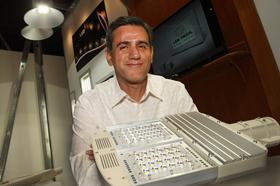A Portland startup is angling to capitalize on the coming spike in sales of LED lighting as prices for the ultra-efficient lighting technology start a downward path.

Sam Manafi, president of LED Trail, said he doesn't want to see the U.S. fall behind in the LED lighting market.
Portland-based LED Trail is setting out to simplify the supply chain for LED lighting — LED stands for light-emitting diode, a semiconductor-driven light source — by acting as the market middleman between buyers and producers.
LED Trail is targeting the commercial and industrial sectors, a multi-billion-dollar market for lighting. While LED lighting has always been the most efficient choice, its upfront cost has been prohibitive to widespread adoption.
"Our niche is lighting that has a higher potential to lower overall energy costs," said Sam Manafi, president and founder of LED Trail.
LED Trail will customize LED lighting from leading suppliers including Livermore, Calif.-based Bridgelux Inc. and North Carolina-based Cree Inc. in configurations that work for commercial and industrial applications.
"We'll choose the top of the line chips," Manafi said. "It's almost like the computer industry. We want to be Dell of the lighting industry."
LED Trail has six employees and expects to grow to about 12 to 15 employees over the next year. Manafi has funded the startup with the help of some debt financing and money from friends and family. Manafi said he is starting to talk to outside investors. He expects to reach at least $1.2 million in revenue within a year.
Aaron Chew, a senior cleantech and alternative energy analyst with Maxim Group LL, said he sees a lot of similarities between the LED market and the solar market.
"They both face tremendous growth from a unit standpoint," Chew said. 'But the very factor that enables that is falling prices."
According to a recent Maxim report, a standard LED bulb carried a price tag late last year of about $40 compared to around $3 for an efficient compact fluorescent bulb. Chew sees that changing fast.
He expects to see costs for LED lighting to come down at a rate of about 30 percent per year and a dramatic increase in installations in the next five to 10 years. While LED lighting has been a tough choice in the past because of its relatively high up front costs, the time for a building owner to see a payback on LED lighting installation will shrink as well.
Chew said a company like LED Trail might be positioned to fare better than the LED manufacturers that will be squeezed by the need to be cost competitive.
"The trick of course is competition," Chew said.
Because LED lighting, like solar panels and computer chips, is a commodity product, there's nothing stopping other companies from getting in the game along with LED Trail.
Manafi meanwhile expresses a sense of urgency about a more global competition.
"If we're not careful, the U.S. will fall behind," Manafi said. "That's exactly what happened in the solar industry."





